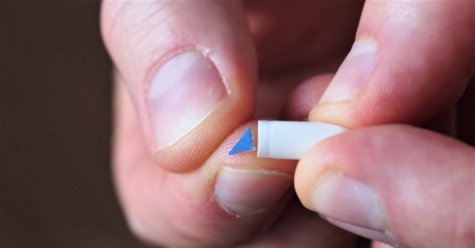LONDON — Is the medicine someone just took really making them feel better already, or do they just think it’s working? For people who advocate using psychedelic drugs to treat mental health issues, a study is providing a “shocking” reality check. Researchers from Imperial College London say the psychological impact of psychedelics is more in the user’s head than the actual potency of the drug.
In the largest placebo-controlled trial on mind-altering drugs to date, participants reported having similar results regardless of whether they were actually microdosing or consumed a placebo. Microdosing is the practice of using small doses of psychedelic drugs in an attempt to improve the user’s health.
Previous studies have suggested that microdosing one to three times a week can boost wellbeing, creativity, and overall cognitive performance. Scientists have looked at the possibility of using these substances to treat depression, addiction, and even obsessive-compulsive disorder.
These studies, however, have usually lacked a control group using dummy pills which could provide a baseline to see how well psychedelics actually work. Researchers say this has left all of these studies vulnerable to the classic placebo effect; where users think they’re receiving a benefit because they were already expecting one.
“Anecdotal reports about the benefits of microdosing are almost certainly biased by the placebo effect,” says lead author Balázs Szigeti in a media release.
Receiving a dose of truth

Szigeti and the team created a citizen science study, recruiting individuals already microdosing on their own. The test allowed 191 participants to set up the experiment at home with a mix of placebos and their microdoses. After the setup stage, the group could not tell which capsules contained their psychedelic drugs and which contained dummy medication.
Researchers call this process “self-blinding” because the participants lose track of which drug they’re taking. Although they didn’t know, barcodes allowed the British team to track who was taking a placebo. The microdosers then filled out surveys about their drug experiences online and participated in cognitive tests over the four-week experiment.
The results reveal both groups, the ones taking real psychoactive drugs and those taking placebos, said they had similar psychological benefits during the four weeks.
“Our results are mixed: on the one hand, we observed microdosing’s benefits in a wide range of psychological measures; on the other hand, equal benefits were seen among participants taking placebos,” Szigeti explains. “These findings suggest that the benefits are not due to the drug, but rather due to the placebo-like expectation effects. Many participants who reported that they experienced positive effects while taking the placebo were shocked to learn after the study that they hadn’t been taking the real drug.”
Looking at trendy drugs with more scrutiny
Study authors caution that their findings are not as reliable as a traditional placebo-controlled study. This is because the microdosers had to provide their own drugs, which potentially involves the black market.
Despite some limitations, the “citizen science” approach to research does more accurately reflect real life conditions, the researchers say. They add their results provide scientists with an inexpensive way of testing drug expectations in a real world scenario.
“The successful execution of this study could inspire similar studies in a broad range of scientific or medical contexts,” senior author David Erritzoe concludes. “Accounting for the placebo effect is important when assessing trends such as the use of cannabidiol oils, fad diets or supplements where social pressure or users’ expectations can lead to a strong placebo response. Self-blinding citizen science initiatives could be used as an inexpensive, initial screening tool before launching expensive clinical studies.”
The study appears in the journal eLife.
